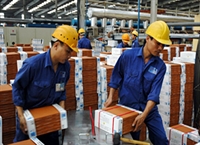|
|
| Lesson of active integration into global economy |
4/25/2009 11:40:00 AM
Vietnamese businesses have gained much experience since the country joined the World Trade Organisation (WTO) two years ago. Local businesses now know that by actively integrating into the global economy and quickly grasping opportunities they can limit their exposure to the vicissitudes of the market. According to Le Tien Truong, Deputy General Director of the Vietnam Garment and Textile Group – one of the country’s two largest exporters, WTO admission has opened up many opportunities and created a breakthrough in the garment sector’s export activities.
In 2007 alone, the sector’s export growth reached 34.7 percent. However, he said, the sector also had to face numerous challenges that forced the sector to renew itself in line with international standards and to compete with many strong foreign rivals.
Luu Van Hai, General Director of the Vietnam Construction and Technology Development and Investment Joint Stock Company (Tecom Vina), said that entry to the WTO has helped Vietnam expand its market and access international capital sources, making it possible for local business to increase their competitiveness and promote their brands. Nevertheless, Mr Hai warned that Vietnamese businesses will also have to face tough competition and the risk of being undercut or pushed out by more efficient companies with better quality products.
In addition, after Vietnam was admitted to the world’s largest economic body more and more foreign businesses have flocked into the country, while Vietnam has not yet fully met requirements in terms of infrastructure and human resources. Hence, local businesses may suffer brain drain and fierce competition.
Mr Truong said that the garment sector is aware of both opportunities and challenges posed by WTO membership. Many seminars and training course on the WTO have been held to provide participants with more experience and knowledge. The sector has paid due attention to calculating production costs transparently as WTO members must price products in line with anti-dumping regulations.
According to Mr Hai, small-and-medium sized enterprises (SMEs) should increase their management capacity and build a long-term strategy to cope with rapid changes in both domestic and international markets.
He also stressed the need to seek measures to mobilise capital sources and apply modern technology in order to successfully integrate into the global economy.
Economist Bui Kien Thanh said that local businesses should concentrate on human resource development and set up business clubs to create stronger links and better mutual support between enterprises.
Since the beginning of this year, Vietnamese businesses have had to face negative impacts caused by high inflation, high interest rates and the global financial crisis.
However, Mr Truong said businesses in the garment sector have made a much greater effort in the past eight months than it did in the previous five years to sharpen their competitive edge by improving the design and quality of products for export. Necessity is the mother of invention. Any businesses which know how to adapt and innovate will hold out well to weather the financial turmoil. And stronger links between themselves will become an inevitable trend. |
| VOV |
| |

